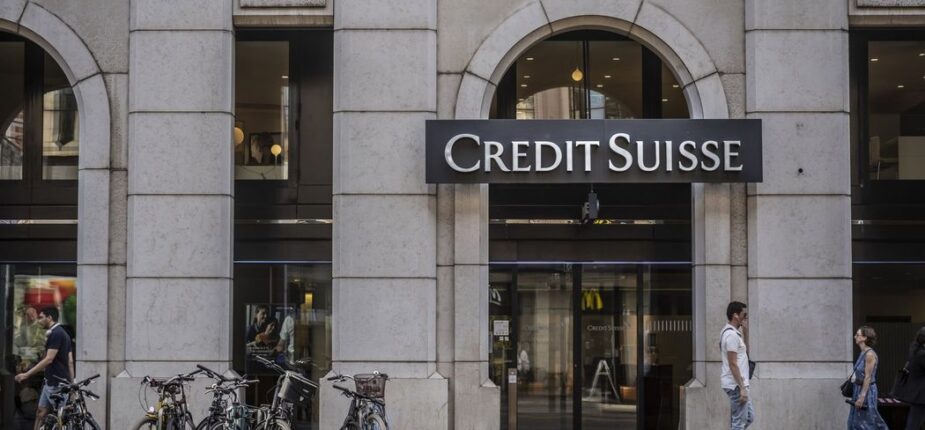
Credit Suisse has been hit by repeated scandals and financial losses. PHOTO: JOSE CENDON/BLOOMBERG NEWS
Intensification of Swiss lender’s difficulties comes days after two major bank failures in the U.S.
Prices on Credit Suisse bail-in bonds, which get wiped out in case the bank runs into serious trouble, fell sharply. Bid prices on the 2027 bonds on Tradeweb slid to 55 cents on the dollar from 72 cents the day before. They traded close to 90 cents at the start of the month.
Credit Suisse has been the problem child of European banking for several years. Repeated scandals and financial losses have hammered the 166-year-old bank, which combines a wealth-management business catering to the world’s elite rich with a Wall Street investment bank.
The lender has cycled through executives and has made repeated stabs at stabilizing its reputation among investors. A $4 billion share sale in the autumn, which brought in deep-pocketed investors from the Middle East, gave the bank more time to sort out its situation. But it has nonetheless faced an exodus of client withdrawals.
The plunge in the shares came after the chairman of Credit Suisse’s largest shareholder, Saudi National Bank, said in a Bloomberg TV interview that the lender wasn’t considering topping up its investment because it would trigger regulatory rules. Saudi National Bank owns 9.9% of Credit Suisse.
Chairman Axel Lehmann said Wednesday at a conference in Saudi Arabia that the bank’s capital and balance sheet were strong, and that “we are all hands on deck” to tackle problems. He said the prospect of government assistance is “not a topic whatsoever.”
But the bank’s difficulties have accumulated in a drumbeat fashion, with little respite for wary Credit Suisse investors. On Tuesday, the bank said it found material weaknesses in its financial reporting. While the errors didn’t change the company’s financial results, the failure reinforced worries about the bank’s ability to stay out of trouble.
Credit Suisse is Switzerland’s second-largest bank after UBS Group AG and is a major player in international financial markets with operations across Europe and Asia and a substantial U.S. business. It had assets of around $580 billion at the end of 2022, more than twice the size of Silicon Valley Bank, which failed last week.
The bank is classified as a “systemically important financial institution” under international banking rules created after the collapse of Lehman Brothers. Such designations require the bank to hold higher amounts of capital and to maintain plans for an orderly unwinding of its operations in case it gets into trouble.
A Swiss National Bank report last year said roughly 70% of Credit Suisse’s balance sheet was outside the country. In Switzerland, it accounted for 13% of domestic loans and 14% of domestic deposits at the end of 2021.
Problems at Credit Suisse loom large over Switzerland’s finance-heavy economy. Banking-sector assets there were around 500% of gross domestic product in 2020, around five times as big as those in the U.S.
Credit Suisse’s U.S. arm is overseen by the Federal Reserve and other financial regulators. Under Swiss bank-resolution processes, financial regulator Finma would take over any failing bank’s global operations and can convert debt to equity and write off securities counting toward regulatory capital. The regulator has said its approach avoids complex and messy jurisdictional disputes between authorities.
European Central Bank officials contacted lenders it supervises Wednesday to ask about financial exposures to Credit Suisse, according to people familiar with the matter.
An ECB spokeswoman declined to comment.
Switzerland officials, including at the Swiss National Bank, have declined to comment. Earlier this week, Finma said it was monitoring developments in the U.S. banking sector after the collapse of Silicon Valley Bank and other lenders. It said it couldn’t comment on its supervision of Credit Suisse.
Credit Suisse has suffered from customers pulling deposits and other assets it manages on behalf of rich clients. The bank said Tuesday the outflows had slowed but hadn’t reversed.
David Callahan, head of cash solutions at Lombard Odier, a smaller rival to Credit Suisse in Switzerland, said his own customers were jittery.
“Credit Suisse is driving the biggest part of the concerns we’re hearing about. The SVB closure and other bank closures that have followed have people questioning whether placing large deposits is right for cash management.” He said money-market funds he manages don’t hold any Credit Suisse assets.
The nerves in markets prompted bank executives to petition ECB officials to hold off on a planned half-percentage-point rate increase Thursday.
Lorenzo Bini Smaghi, former executive board member of the ECB and chairman of Société Générale, said in an interview with German newspaper Boersen-Zeitung that financial contagion has already led to some tightening of monetary conditions. If overdone, the ECB could risk a repeat of 2011, when it continued to lift interest rates despite contagion from Greece’s debt troubles.
“When one part of the financial system goes into crisis, it’s normal for there to be some contagion to the whole system, as investors tend to wonder, ‘Who’s next?’”
Featured article licensed from The Wall Street Journal.











